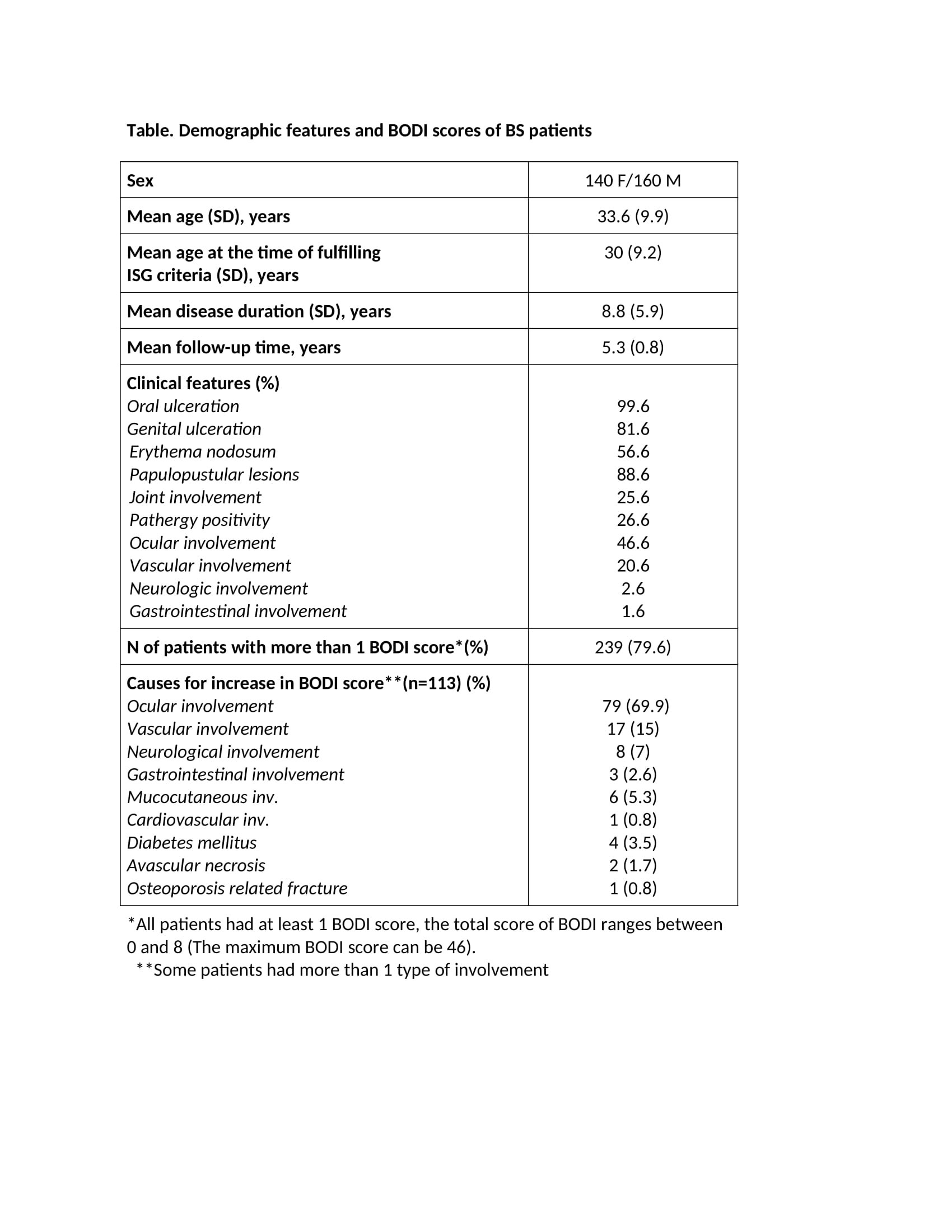Session Information
Date: Sunday, November 13, 2022
Title: Vasculitis – Non-ANCA-Associated and Related Disorders Poster II
Session Type: Poster Session C
Session Time: 1:00PM-3:00PM
Background/Purpose: Damage accrual in Behçet syndrome (BS) may progress over the years and an index that can be scored using retrospective data may be useful in measuring damage accrual over a long time and comparing different treatment strategies or patient populations. We aimed to assess the construct validity, reproducibility, sensitivity to change and feasibility of Behçet’s Disease Overall Damage Index (BODI) for use in retrospective studies, and to identify items that may be missing in BODI.
Methods: BODI was translated into Turkish with the principles of scale adaptation and translated backwards by 2 people. The study included 300 patients with at least 2 visits at 1-year intervals out of 712 consecutive BS patients admitted between 2015-2017. Correlation between BODI score of the same patient that was assessed during a face-to-face visit and that was calculated retrospectively using patient charts was evaluated using intraclass correlation coefficient (ICC). Interobserver and intraobserver correlation, correlation with disease activity and feasibility were also evaluated.
Results: The mean BODI score was 1.56 ± 1.44 SD. There was good correlation between face-to-face and retrospective evaluation (ICC 0.998; [%95CI 0.997-0.999]), good interobserver agreement (ICC 0.96 [95%CI 0.94-0.98]) and intraobserver agreement (ICC 1). No correlation with disease activity was detected (r=-0.01, p=0.5). We observed an increase in BODI score in 113 (37.6%) patients during follow-up. The main reasons for increasing BODI scores were eye, vascular and neurological involvement (Table). Items not captured by BODI were hypertension, lymphedema, liver failure, glaucoma, damage due to venous interventions and lung parenchymal involvement. The mean time to complete the form was 1.5 (1-4) minutes.
Conclusion: The validated Turkish version of BODI is convenient and applicable in terms of construct validity and can be used reliably in retrospective studies. Whether modification of BODI by adding damage items identified in this study would make it an even better scale warrants further studies.
To cite this abstract in AMA style:
Yagiz Ozogul Y, Ozguler Y, Ucar D, Uygunoglu U, Kutlubay Z, Hamuryudan V, Hatemi g. Validation of Behçet’s Disease Overall Damage Index (BODI) for Retrospective Studies and a Proposal for Modification [abstract]. Arthritis Rheumatol. 2022; 74 (suppl 9). https://acrabstracts.org/abstract/validation-of-behcets-disease-overall-damage-index-bodi-for-retrospective-studies-and-a-proposal-for-modification/. Accessed .« Back to ACR Convergence 2022
ACR Meeting Abstracts - https://acrabstracts.org/abstract/validation-of-behcets-disease-overall-damage-index-bodi-for-retrospective-studies-and-a-proposal-for-modification/

